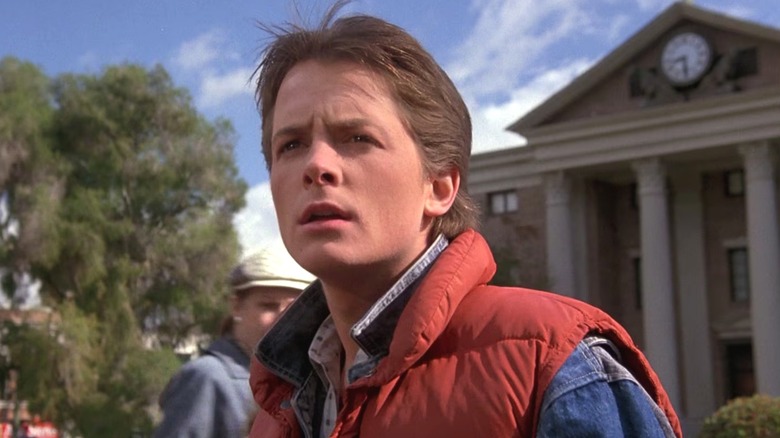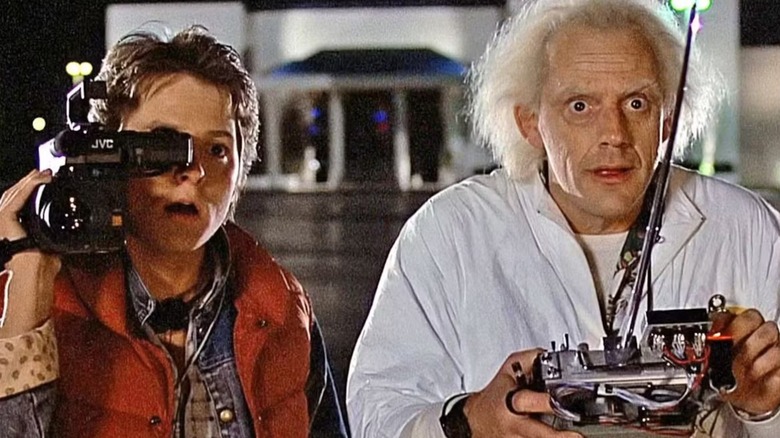Why Steven Spielberg Hid Michael J. Fox's Back To The Future Hiring Until He Started Shooting
It is impossible to envision the "Back to the Future" franchise without Michael J. Fox's Marty McFly. The 1985 film's deeply nostalgic quality aside, Marty establishes himself as a relatable protagonist, whose flaws ultimately endear him to us. Moreover, the enduring chemistry between Fox's Marty and Christopher Lloyd's Doc Brown feels immediate, forming the emotional crux of the first movie — a solid foundation that Parts II and III confidently build upon. But Fox didn't play Marty when Robert Zemeckis' film first started filming, as the character was initially played by Eric Stoltz, who was replaced a few weeks into production.
While Zemeckis had good reason to replace Stoltz, this recast had to be kept tightly under wraps out of fear that it would be interpreted as a sign of a doomed production (which would fuel predictions about the film becoming a box office bomb). In an interview with Entertainment Weekly, Fox and Nelle Fortenberry — who co-authored the memoir "Future Boy" alongside the actor — talked about how the studio/producers didn't want to risk jeopardizing the film's public perception before release.
Fox clarified that folks were unaware of the fact that he was rushed into production "six weeks in" and that Steven Spielberg (involved via his production company, Amblin Entertainment) was apprehensive about letting Stoltz go before the recast was finalized:
"Until my deal was locked in, Bob Zemeckis and his co-writer/producer, Bob Gale, continued filming with Eric Stoltz, who was unaware of the impending change. [Producer Steven Spielberg] was afraid that if they let him go prematurely and production shut down, the whole film could implode. Universal needed assurance that a plan was in place for a seamless transition to a new lead actor."
As it turns out, the decision to keep the Stoltz-Fox swap hush-hush was well-founded. Here's why.
There was a time when Back to the Future was expected to fail
History dictates that Zemeckis' "Back to the Future" became an instant classic. The film received really positive reactions at test screenings, and its early summer release was met with overwhelming critical and commercial success. Given the memorable legacy etched by the, ahem, timeless sci-fi classic, it is difficult to envision any level of anxiety surrounding the film's public perception or box office success. But these fears were tangible, as eventual reporting about the Stoltz-Fox swap led to the film being labeled as "a hot mess" even before release. Fortenberry sheds some light on this aspect:
"They managed to keep the fact that Eric had left the movie and Michael was coming on a secret until Michael started. But a headline in a major trade paper ultimately arrived, announcing that it had taken place, and it called the movie 'troubled.' 'The troubled production of Back to the Future.' So I think a lot of people in the business thought, 'Oh, this must be a mess. This is just a hot mess, this movie.'"
Stoltz's exit wasn't due to some dramatic fallout, but rather the delayed realization that the talented actor (who went on to star as the lead in "The Fly II" soon after) was woefully miscast as Marty. Stoltz's Marty was drastically different from the version Zemeckis had intended, as the actor — in Fox's words — interpreted that character with "a little more tragedy." This almost-Shakespearean take clashed with the film's sincere, lighthearted tone, which is why Fox was brought in at such short notice. Perhaps it is fate that Fox's performance won Zemeckis and Spielberg over at the time — after all, "Back to the Future" might've experienced a very different fate without his Marty at its center.

